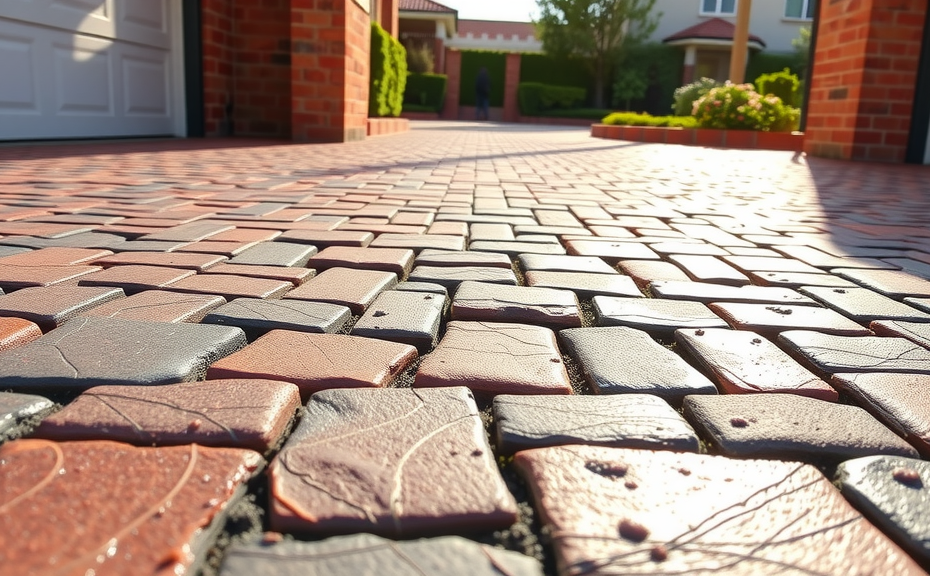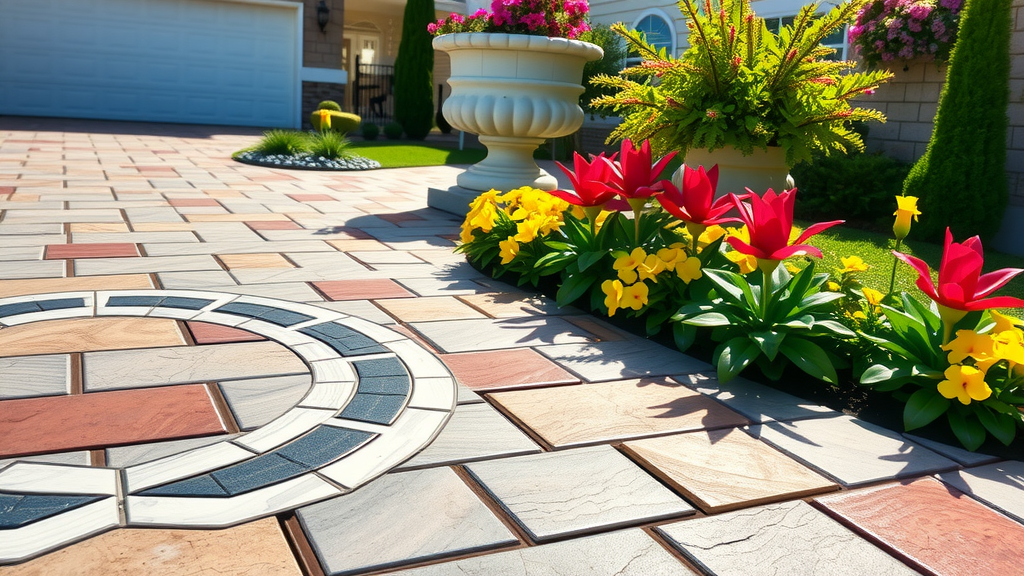Choosing a suitable driveway can significantly impact both functionality and appearance. The financial implications of selecting resin bonded options require careful scrutiny of various elements.
These driveways often present a unique appeal in terms of outdoor aesthetics, yet their cost can fluctuate widely.
Factors such as the quality of paving materials used and the intricacy of the driveway installation play a pivotal role in determining the overall price.
Many homeowners are surprised to learn that the initial costs may mask potential long-term savings. By considering the durability and low maintenance associated with resin solutions, individuals can evaluate whether this choice provides future economic benefits. Assessing the comprehensive cost analysis of such materials reveals that while upfront expenses may be high, the long-term benefits of resin bound driveway installation, including reduced maintenance costs and enhanced outdoor aesthetics, often justify the investment when compared to traditional paving materials.
Is Resin Bound Worth The Investment
Homeowners and businesses are increasingly exploring alternative materials for driveways, drawn to the unique attributes of resin bound surfaces. Their longlasting durability enables them to endure a variety of weather conditions, making them a cost-effective option in the long run.
Installation techniques involve placing a combination of resin and aggregate onto a prepared base, resulting in a resilient surface.
Although the initial expenses may surpass those associated with asphalt or concrete, the significantly lower maintenance needs often balance out this investment.
The permeability of these surfaces allows for effective water drainage, minimizing risks of flooding and enhancing longevity. Such considerations are contributing to the rising interest in this paving choice.
Transitioning from examining the financial implications to the process of driveway installation, it’s important to analyze how these surfaces can serve as strategic investments. When assessing the price comparison of resin bound materials against traditional options, the longevity, longlasting durability, maintenance needs, surface permeability, installation techniques, and decorative finishes must all be considered.
Understanding Driveway Installation Costs
Estimating expenses for installing a driveway involves multiple considerations that may not be immediately apparent to homeowners. Various materials, such as asphalt, concrete, and gravel, come with distinct pricing structures, impacting the overall project cost.
Ecofriendly options, including resin driveways, introduce additional variables due to their specific installation processes and material properties.
For instance, while concrete can offer a lifespan of up to 30 years, gravel typically lasts around 10-15 years, influencing long-term property value.
Geographic location also significantly affects labor and material expenses, leading to varying costs depending on the region.
Preparation work is a common yet often overlooked factor, as grading and drainage can require substantial investment before any actual installation. Homeowners should factor in potential permitting fees and the possibility of unanticipated repairs, which can arise during the installation phase. A detailed breakdown of overall home improvement can significantly enhance property value by incorporating ecofriendly options that ensure UV stability and slip resistance, making it ideal for various DIY projects.
Driveway Installation Costs
- Different materials like asphalt, concrete, and gravel have varying pricing structures that affect overall costs.
- Ecofriendly options, such as resin driveways, require unique installation processes that can influence expenses.
- Preparation work, including grading and drainage, can significantly increase the initial investment needed for installation.
- Geographic location plays a crucial role in determining labor and material costs, resulting in price variations across regions.
Cost Analysis Of Resin Driveways
Exploring driveway materials reveals various options that each possess unique characteristics and pricing. A noteworthy choice is made from a combination of advanced resin technology and decorative aggregates, which provide both resilience and visual appeal.
The overall cost assessment is significantly influenced by factors such as weather resistance and the complexity of the installation process.
Typically, the estimated price for these driveways falls between $40 and $60 per square meter, with deviations based on regional labor expenses and the selected materials’ quality.
Professional contractors often suggest seamless textures to mitigate issues like water pooling, enhancing functionality. Although the initial expenditure may seem high, these installations can yield considerable long-term savings given their low maintenance requirements.
As one evaluates total cost, it becomes clear how these innovative surfaces compete with other aggregate surfacing options.
How Do Aggregate Surfacing Options Compare
When evaluating various options for surfacing, it becomes clear that these materials exhibit distinct characteristics affecting their overall utility and cost. For instance, resin-bound surfaces create a seamless aesthetic, which many homeowners find appealing, while gravel driveways serve as economical driveway alternatives that necessitate careful site preparation to achieve effective drainage solutions.
Concrete aggregate surfaces are particularly noted for their impressive hardness rating, making them suitable for areas with heavy foot and vehicle traffic.
Conversely, bituminous surfaces offer notable flexibility and resistance to cracking, although they can lead to difficulties concerning surface repair over time.
The lifespan expectancy of each material varies significantly, influenced by environmental conditions and maintenance routines, ultimately shaping the long-term value of the investment.
| Material | Characteristics | Cost Efficiency | Lifespan Expectancy |
|---|---|---|---|
| Resin-bound surfaces | Seamless aesthetic | Moderate | Varies with maintenance |
| Gravel driveways | Economical, requires site preparation | High | Varies with environmental conditions |
| Concrete aggregate surfaces | High hardness, suitable for heavy traffic | Moderate to high | Long-lasting with proper care |
| Bituminous surfaces | Flexible, resistant to cracking | Moderate | Requires regular maintenance for longevity |
Exploring Outdoor Aesthetics With Resin
Creative applications of a versatile material can significantly enhance the visual impact of outdoor spaces. Its properties enable various uses, including residential driveways and commercial applications, offering both attractiveness and functionality.
The unique ability to imitate natural textures, such as wood or stone, facilitates seamless integration into different landscapes.
With an extensive palette of colors and finishes, homeowners can craft an outdoor design that aligns with their personal taste while maintaining aesthetic appeal.
User satisfaction is often reflected in customer reviews, which emphasize the material’s longevity and minimal maintenance, further contributing to its popularity in enhancing outdoor environments.
What Are The Longlasting Durability Benefits
The selection of materials significantly influences how long outdoor surfaces can withstand wear and tear. Specific products are designed not only to maintain surface integrity but also to minimize the frequency of maintenance required.
For example, resin surfaces offer exceptional performance against extensive wear and are crafted to remain visually appealing throughout their lifespan.
Unlike traditional paving solutions, resin options exhibit remarkable strength derived from their unique molecular structure.
This durability leads to a reduction in replacements, enhancing the investment value for homeowners over the years. These surfaces demonstrate a strong ability to resist environmental impacts, including UV exposure and temperature variations, establishing them as a dependable choice for longevity.
Transitioning from aesthetics to practicality, exploring the maintenance needs for resin surfaces reveals further advantages.
Homeowners will find that the proactive approach to material sourcing allows for easy upkeep, making it an attractive option for outdoor spaces.
Resin Surfaces
- Resin surfaces are designed to withstand extensive wear, maintaining surface integrity over time.
- These surfaces have a unique molecular structure that provides exceptional strength compared to traditional paving solutions.
- Resin surfaces require less frequent replacements, enhancing long-term investment value for homeowners.
- They effectively resist environmental impacts such as UV exposure and temperature variations, ensuring longevity.
Evaluating Maintenance Needs For Resin Surfaces
Evaluating maintenance necessities plays an important role in enhancing the lifespan of resin surfaces. Exploring Resin Surface Composition is a significant starting point.
Resin driveways commonly consist of a blend of polyurethane and epoxy, impacting their long-term durability and resistance to wear.
The surface texture is influential as well; a rough surface can accumulate more debris, leading to increased cleaning frequency and associated labor costs.
Common Maintenance Requirements necessitate routine cleaning with pH-neutral detergents to prevent damage to the resin material. Potential damage can arise from cracks due to extreme temperature shifts or pressure from heavy vehicles, emphasizing the importance of timely assessments to prevent costly repairs.
Frequency of Maintenance can fluctuate based on traffic volume and seasonal considerations. Regular inspections are advisable, particularly after assessing labor costs, performance metrics, and seasonal considerations, to ensure optimal road safety based on expert advice.
Tips For Choosing Professional Contractors
Making informed decisions about contractors can greatly influence the success of your project.
When reviewing bids, focus on project budgeting to maintain financial feasibility throughout.
Contractors often present varying pricing structures; thus, discerning what each quote encompasses is important.
Exploring gravel alternatives might reveal economically viable options without sacrificing finish quality.
Checking reviews of past work can help assess reliability and overall customer satisfaction.
Staying updated with current driveway trends can enhance property enhancement while affecting both aesthetic appeal and overall costs

